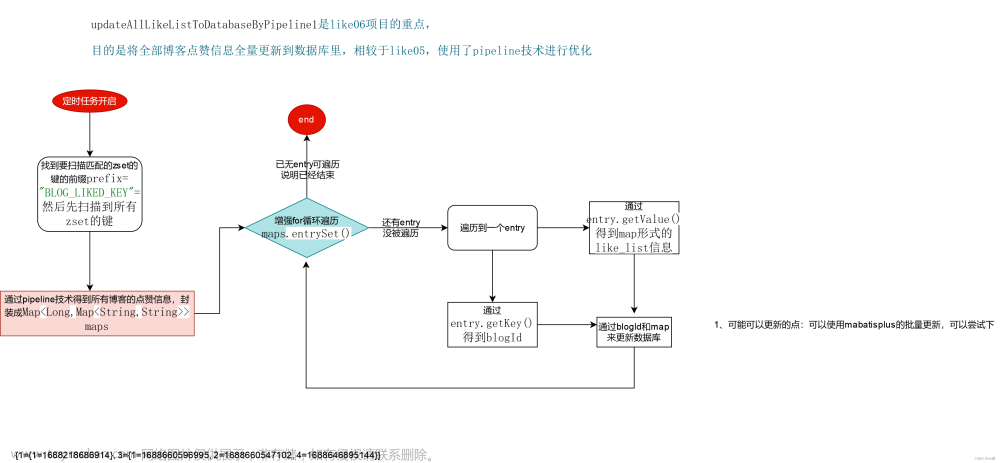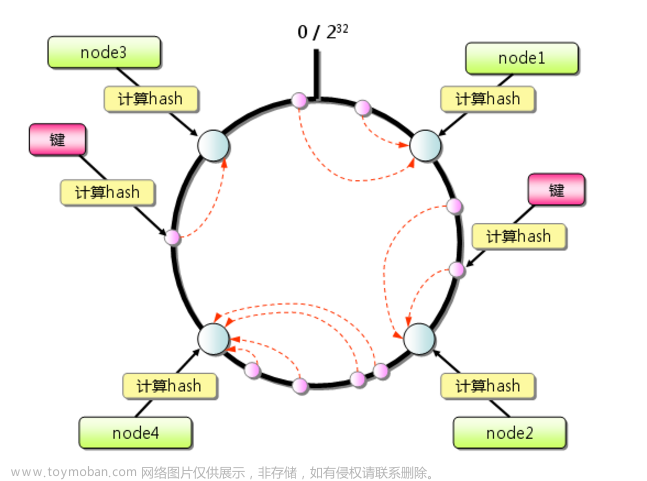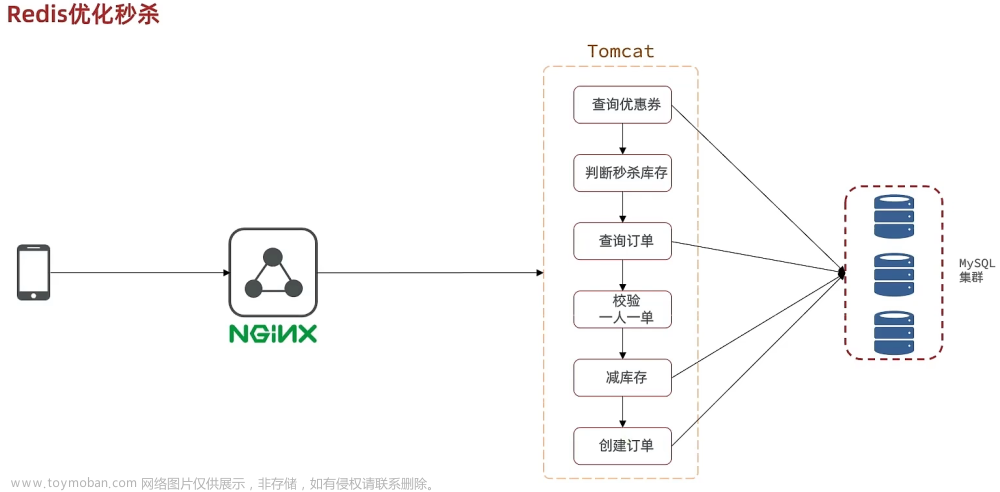缓存优化–使用Redis
- 问题描述:
用户数量多,系统访问量大的时候,用户发送大量的请求,导致频繁访问数据库,系统性能下降,用户体验差。
1、环境搭建
- maven坐标
在项目的pom.xml文件中导入spring data redis的maven坐标:
<dependency>
<groupId>org.springframework.boot</groupId>
<artifactId>spring-boot-starter-data-redis</artifactId>
</dependency>
- 配置文件
在项目的application. ym1中加入redis相关配置:
spring:
redis:
host: localhost
port: 6379
password: 123456
database: 0 #操作的是0号数据库
- 配置类
在项目中加入配置类Redisconfig:
package com.mannor.reggie_take_out.config;
import org.springframework.cache.annotation.CachingConfigurerSupport;
import org.springframework.context.annotation.Bean;
import org.springframework.context.annotation.Configuration;
import org.springframework.data.redis.connection.RedisConnectionFactory;
import org.springframework.data.redis.core.RedisTemplate;
import org.springframework.data.redis.serializer.StringRedisSerializer;
@Configuration
public class RedisConfig extends CachingConfigurerSupport {
@Bean
public RedisTemplate<Object, Object> redisTemplate(RedisConnectionFactory connectionFactory) {
RedisTemplate<Object, Object> redisTemplate = new RedisTemplate<>();
//默认的Key序列化器为:JdkSerializationRedisSerializer
redisTemplate.setKeySerializer(new StringRedisSerializer()); //String !!!
redisTemplate.setConnectionFactory(connectionFactory);
return redisTemplate;
}
}
2、缓存短信验证码
2.1、实现思路
- 之前我学习的项目已经实现了移动端手机验证码登录,随机生成的验证码我们是保存在HttpSession中的。(点击产看基于阿里云的短信验证实现文章)现在需要改造为将验证码缓存在Redis中,具体的实现思路如下:
1、在服务端UserController中注入RedisTemplate对象,用于操作Redis
2、在服务端UserController的sendMsg方法中,将随机生成的验证码缓存到Redis中,并设置有效期为5分钟
3、在服务端UserController的login方法中,从Redis中获取缓存的验证码,如果登录成功则删除Redis中的验证码
2.2、代码改造
将session改造成redis(存在注释):
package com.mannor.reggie_take_out.controller;
import com.baomidou.mybatisplus.core.conditions.query.LambdaQueryWrapper;
import com.mannor.reggie_take_out.Utils.SMSUtils;
import com.mannor.reggie_take_out.Utils.ValidateCodeUtils;
import com.mannor.reggie_take_out.common.R;
import com.mannor.reggie_take_out.entity.User;
import com.mannor.reggie_take_out.service.UserService;
import lombok.extern.slf4j.Slf4j;
import org.apache.commons.lang.StringUtils;
import org.springframework.beans.factory.annotation.Autowired;
import org.springframework.data.redis.core.RedisTemplate;
import org.springframework.web.bind.annotation.PostMapping;
import org.springframework.web.bind.annotation.RequestBody;
import org.springframework.web.bind.annotation.RequestMapping;
import org.springframework.web.bind.annotation.RestController;
import javax.servlet.http.HttpSession;
import java.util.Map;
import java.util.concurrent.TimeUnit;
@RestController
@Slf4j
@RequestMapping("/user")
public class UserController {
@Autowired
private UserService userService;
@Autowired
private RedisTemplate redisTemplate;
/**
* 发送短信验证码
*
* @param user
* @param session
* @return
*/
@PostMapping("/sendMsg")
public R<String> sendMsg(@RequestBody User user, HttpSession session) {
//获取手机号
String phone = user.getPhone();
if (StringUtils.isNotEmpty(phone)) {
//生成随机的6位验证码
String code = ValidateCodeUtils.generateValidateCode(6).toString();
log.info("code={}", code);
//调用阿里云提供的短信服务API完成发送短信
SMSUtils.sendMessage("mannor的博客", "SMS_4203645", phone, code);
//需要将生成的验证码保存到Session
//session.setAttribute(phone, code);
//将生成的验证码报错到redis中,并且设置5分钟失效
redisTemplate.opsForValue().set(phone, code, 5L, TimeUnit.SECONDS);
return R.success("短信验证码发送成功!");
}
return R.error("短信验证码发送失败!");
}
@PostMapping("/login")
public R<User> login(@RequestBody Map map, HttpSession session) {
log.info("map={}", map);
//获取手机号
String phone = map.get("phone").toString();
//获取验证码
String code = map.get("code").toString();
//从Session中获取保存的验证码
//Object codeInSession = session.getAttribute(phone);
//进行验证码的比对(页面提交的验证码和Session中保存的验证码比对)
//从redis中获得缓存的验证码
Object codeInSession = redisTemplate.opsForValue().get(phone);
if (codeInSession != null && codeInSession.equals(code)) {
// 如果能够比对成功,说明登录成功
LambdaQueryWrapper<User> lambdaQueryWrapper = new LambdaQueryWrapper<>();
lambdaQueryWrapper.eq(User::getPhone, phone);
User user = userService.getOne(lambdaQueryWrapper);
if (user == null) {
//判断当前手机号对应的用户是否为新用户,如果是新用户就自动完成注册
user = new User();
user.setPhone(phone);
user.setStatus(1);
userService.save(user);
}
session.setAttribute("user", user.getId());
//如果用户登录成功那就删除redis中缓存的验证码
redisTemplate.delete(phone);
return R.success(user);
}
}
3、缓存菜品数据
3.1、实现思路
- 之前我已经实现了移动端菜品查看功能,对应的服务端方法为DishController的list方法,此方法会根据前端提交的查询条件进行数据库查询操作。在高并发的情况下,频繁查询数据库会导致系统性能下降,服务端响应时间增长。现在需要对此方法进行缓存优化,提高系统的性能。
具体的实现思路如下:
1、改造DishController的list方法,先从Redis中获取菜品数据,如果有则直接返回,无需查询数据库;如果没有则查询数据库,并将查询到的菜品数据放入Redis。
2、改造DishController的save和update方法,加入清理缓存的逻辑。
注意:在使用缓存过程中,要注意保证数据库中的数据和缓存中的数据一致,如果数据库中的数据发生变化,需要及时清理缓存数据。
3.2、代码改造
以点餐系统菜品查询为例
原先的list查询代码:
@Slf4j
@RestController
@RequestMapping("/dish")
public class DishController {
@Autowired
private DishService dishService;
@Autowired
private DishFlavorService dishFlavorService;
@Autowired
private CategoryService categoryService;
/**
* 套餐管理中添加套餐中的菜品
*
* @param dish
* @return
*/
@GetMapping("/list")
public R<List<DishDto>> list(Dish dish) {
//构造查询条件
LambdaQueryWrapper<Dish> queryWrapper = new LambdaQueryWrapper<>();
queryWrapper.eq(dish.getCategoryId() != null, Dish::getCategoryId, dish.getCategoryId());
//添加条件,查询状态为1(起售状态)的菜品
queryWrapper.eq(Dish::getStatus, 1);
//添加排序条件
queryWrapper.orderByAsc(Dish::getSort).orderByDesc(Dish::getUpdateTime);
List<Dish> list = dishService.list(queryWrapper);
List<DishDto> dishDtoList = list.stream().map((item) -> {
DishDto dishDto = new DishDto();
BeanUtils.copyProperties(item, dishDto);
Long categoryId = item.getCategoryId();//分类id
//根据id查询分类对象
Category category = categoryService.getById(categoryId);
if (category != null) {
String categoryName = category.getName();
dishDto.setCategoryName(categoryName);
}
//当前菜品的id
Long dishId = item.getId();
LambdaQueryWrapper<DishFlavor> lambdaQueryWrapper = new LambdaQueryWrapper<>();
lambdaQueryWrapper.eq(DishFlavor::getDishId, dishId);
//SQL:select * from dish_flavor where dish_id = ?
List<DishFlavor> dishFlavorList = dishFlavorService.list(lambdaQueryWrapper);
dishDto.setFlavors(dishFlavorList);
return dishDto;
}).collect(Collectors.toList());
return R.success(dishDtoList);
}
}
redis缓存后的查询代码:
@Slf4j
@RestController
@RequestMapping("/dish")
public class DishController {
@Autowired
private DishService dishService;
@Autowired
private DishFlavorService dishFlavorService;
@Autowired
private CategoryService categoryService;
@Autowired
private RedisTemplate redisTemplate;
/**
* 套餐管理中添加套餐中的菜品
*
* @param dish
* @return
*/
@GetMapping("/list")
public R<List<DishDto>> list(Dish dish) {
List<DishDto> dishDtoList = null;
//动态的构造一个key,用于redis缓存
String key = "dish_" + dish.getCategoryId() + "_" + dish.getStatus();
//从redis获取缓存的数据
dishDtoList = (List<DishDto>) redisTemplate.opsForValue().get(key);
if (dishDtoList != null) {
//如果存在,直接返回,不需要查询数据库
return R.success(dishDtoList);
}
//构造查询条件
LambdaQueryWrapper<Dish> queryWrapper = new LambdaQueryWrapper<>();
queryWrapper.eq(dish.getCategoryId() != null, Dish::getCategoryId, dish.getCategoryId());
//添加条件,查询状态为1(起售状态)的菜品
queryWrapper.eq(Dish::getStatus, 1);
//添加排序条件
queryWrapper.orderByAsc(Dish::getSort).orderByDesc(Dish::getUpdateTime);
List<Dish> list = dishService.list(queryWrapper);
dishDtoList = list.stream().map((item) -> {
DishDto dishDto = new DishDto();
BeanUtils.copyProperties(item, dishDto);
Long categoryId = item.getCategoryId();//分类id
//根据id查询分类对象
Category category = categoryService.getById(categoryId);
if (category != null) {
String categoryName = category.getName();
dishDto.setCategoryName(categoryName);
}
//当前菜品的id
Long dishId = item.getId();
LambdaQueryWrapper<DishFlavor> lambdaQueryWrapper = new LambdaQueryWrapper<>();
lambdaQueryWrapper.eq(DishFlavor::getDishId, dishId);
//SQL:select * from dish_flavor where dish_id = ?
List<DishFlavor> dishFlavorList = dishFlavorService.list(lambdaQueryWrapper);
dishDto.setFlavors(dishFlavorList);
return dishDto;
}).collect(Collectors.toList());
//不存在,就需要查询数据库,将查询道德数据缓存到redis中华
redisTemplate.opsForValue().set(key, dishDtoList, 60, TimeUnit.MINUTES);//设置60分钟后过期
return R.success(dishDtoList);
}
}
当然,更新数据之后也需要将缓存清理(以update为例):文章来源:https://www.toymoban.com/news/detail-676399.html
/**
* 添加菜品
*
* @param dishDto
* @return
*/
@PutMapping
public R<String> update(@RequestBody DishDto dishDto) {
log.info("更新菜品的参数dishDto={}", dishDto);
dishService.updateWithFlavor(dishDto);
//更新之后清理菜品数据,免得产生脏数据
//Set keys = redisTemplate.keys("dish_*");
//redisTemplate.delete(keys);
//精确清理-->清理某个分类下的菜品缓存数据
String key = "dish_" + dishDto.getCategoryId() + "_1";
redisTemplate.delete(key);
return R.success("菜品更新成功");
}
使用Spring Cache进行开发会更简洁,更容易,文章推荐:Spring Cache的介绍以及怎么使用(redis)文章来源地址https://www.toymoban.com/news/detail-676399.html
到了这里,关于缓存优化--使用Redis将项目进行优化的文章就介绍完了。如果您还想了解更多内容,请在右上角搜索TOY模板网以前的文章或继续浏览下面的相关文章,希望大家以后多多支持TOY模板网!










